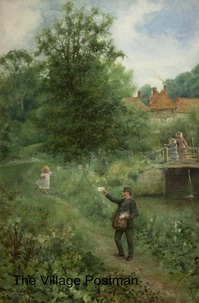The Village Postman
|
Research by Barbra Cropper
|
|
Acc No 158
Artist Alfred Augustus Glendening Jnr Artist dates 1861-1907 Medium oil on canvas Size 76.2 x 50.8 cm (30 x 20 in) Date painted unknown Inscr: signed in monogram (L.L.) Donor Johnson Jackson, Clifton Drive North Lytham St Annes Date donated 20 March 1944 |
|
ARTIST
Alfred Augustus Glendening was a London landscape painter who is believed to have been born in Greenwich in 1840. He started work as a railway clerk but then soon became one of the most popular landscape artists of his time. Subjects include views on the River Thames, in the southern counties, Wales and Scotland. In the Scottish Highlands he enjoyed painting dramatic landscapes, which often included lochs and cattle. His son and pupil, also named Alfred Augustus Glendening, was born in 1861. They both painted in a broad, realistic fashion similar to Alfred de Breanski, whose technique was to focus on the effects of light and colour, often impressionistic in style. Alfred, Senior, exhibited at the Royal Academy between 1865 and 1903. His other works include: Resting by the Wayside Crossing the Mill Stream Peaceful Waters along the Thames A Well Earned Rest (1903) Herding the Sheep along the Country Lane However, it should be noted that Christies (2014) attribute this painting to his son, Alfred Augustus Glendening (1861-1907). Further investigation is required. PAINTING The Village Postman seems unusual for Glendening as it features four figures, although it could in fact be compared to Resting by the Wayside, which features three figures and a flock of sheep. In this painting light touches of white on the trees is a reminder of Constable, who used this effect. The red jumper also shows that he had viewed Constable's paintings which often contained this characteristic touch of red paint. Both paintings have a path weaving through the trees. However, in The Village Postman, the colours are predominately greens whereas Resting by the Wayside is mainly bright yellows and soft greens with a distinctly Impressionist touch. A comparison of these two paintings would suggest that The Village Postman may have been one of his earlier works. |
REFERENCES
Wood, Christopher Dictionary of Victorian Painters The Royal Society of British Artists 1824-1893 Antiques Dealers Club |

